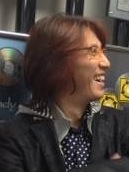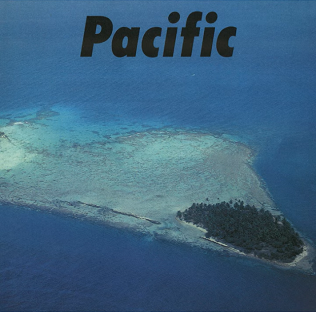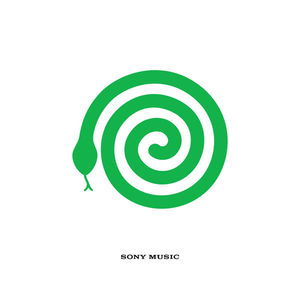Related Research Articles
Akiko Yano is a Japanese pop and jazz musician and singer born in Tokyo and raised in Aomori and later began her singing career in the mid-1970s. She has been called "one of the major musical talents of the Japanese popular music world", and her vocals and singing style have been compared to English singer Kate Bush.

Chiptune, also called 8-bit music, is a style of electronic music made using the programmable sound generator (PSG) sound chips or synthesizers in vintage arcade machines, computers and video game consoles. The term is commonly used to refer to tracker format music using extremely basic and small samples that an old computer or console could produce, as well as music that combines PSG sounds with modern musical styles. It has been described as "an interpretation of many genres" since any existing song can be arranged in a chiptune style defined more by choice of instrument and timbre than specific style elements.

Yellow Magic Orchestra was a Japanese electronic music band formed in Tokyo in 1978 by Haruomi Hosono, Yukihiro Takahashi and Ryuichi Sakamoto. The group is considered influential and innovative in the field of popular electronic music. They were pioneers in their use of synthesizers, samplers, sequencers, drum machines, computers, and digital recording technology, and effectively anticipated the "electropop boom" of the 1980s. They are credited with playing a key role in the development of several electronic genres, including synthpop, J-pop, electro, and techno, while exploring subversive sociopolitical themes throughout their career.

Uwe H. Schmidt, also known as Atom™, Atom Heart, or Señor Coconut, is a German composer, musician and producer of electronic music. He was active in the development of electrolatino, electrogospel, and aciton music. In the nineties, Schmidt moved to Chile and developed part of his career there, adopting the alias Señor Coconut.

Happy End was a Japanese folk rock band active from 1969 to 1972. Composed of Haruomi Hosono, Eiichi Ohtaki, Takashi Matsumoto and Shigeru Suzuki, the band's pioneering sound was regarded as avant-garde to most Japanese at the time. They are considered to be among the most influential artists in Japanese music. MTV described Happy End's music as "rock with psych smudges around the edges."
J-pop, natively also known simply as pops, is the name for a form of popular music that entered the musical mainstream of Japan in the 1990s. Modern J-pop has its roots in traditional music of Japan, and significantly in 1960s pop and rock music. J-pop replaced kayōkyoku, a term for Japanese popular music from the 1920s to the 1980s in the Japanese music scene.

Haruomi Hosono, sometimes credited as Harry Hosono, is a Japanese musician, singer, songwriter and record producer. He is considered to be one of the most influential musicians in Japanese pop music history, credited with shaping the sound of Japanese pop for decades as well as pop music outside of Japan. He also inspired genres such as city pop and Shibuya-kei, and as the leader of the Yellow Magic Orchestra, contributed to the development and pioneering of numerous electronic genres.

Yukihiro Takahashi was a Japanese musician, singer, record producer, fashion designer, and actor, who was best known internationally as the drummer, lead vocalist, & 2nd keyboardist of the Yellow Magic Orchestra, as the former drummer of the Sadistic Mika Band, and as the drummer & backing vocalist of the Sadistics. He was also a member of the groups: the Beatniks, Sketch Show, & Metafive.

Yellow Magic Orchestra is the first official studio album by Japanese electronic music band Yellow Magic Orchestra, who were previously known as the Yellow Magic Band. Originally released by Alfa Records, in Japan in 1978, the album was released by A&M Records in Europe and the United States and Canada in early 1979, with the US version featuring new cover art but without the closing track of "Acrobat". Both versions would later be re-issued in 2003 as a double-disc format, with the American version as the first disc.

Alfa Records Inc., originally a publisher known as Alfa Music Ltd. and later succeeded by record company Alfa Music Inc., was established in 1969 by composer and record producer Kunihiko Murai. It was formed into an independent record label known as Alfa Records in 1977. A short-lived American subsidiary operated from 1980 to 1982.

Happy End is the self-titled debut album by Japanese folk rock band Happy End. Because their third album is also self-titled, although written in English, this first album is also known by the name "Yudemen" (ゆでめん) after the sign depicted in the cover art.
"Cow Cow Boogie (Cuma-Ti-Yi-Yi-Ay)" is a "country-boogie"-style blues song, with music was written by Don Raye, and lyrics were written by Benny Carter and Gene De Paul. The song was written for the 1942 Abbott & Costello film Ride 'Em Cowboy, which included Ella Fitzgerald as a cast member, but was cut from the movie.

Takako Minekawa is a Japanese musician, singer, songwriter, and writer.
Daijiro Morohoshi is a Japanese manga artist. He is well known for science fiction comics, allegorical comics and horror/mystery comics based on pseudohistory and folklore. The indirect influence by Cthulhu Mythos also appears here and there in his works.

Toshiki Kadomatsu is a Japanese singer-songwriter, musician, and producer best known as one of the pioneers of the city pop genre. He has released many studio albums, as well as several instrumental and live albums. He has been active since 1981.
City pop is a loosely defined form of Japanese pop music that emerged in the late 1970s and peaked in popularity during the 1980s. It was originally termed as an offshoot of Japan's Western-influenced "new music", but came to include a wide range of styles – including funk, disco, R&B, AOR, soft rock, and boogie – that were associated with the country's nascent economic boom and leisure class. It was also identified with new technologies such as the Walkman, cars with built-in cassette decks and FM stereos, and various electronic musical instruments.

Vaporwave is a microgenre of electronic music and a subgenre of hauntology, a visual art style, and an Internet meme that emerged in the early 2010s, and became well-known in 2015. It is defined partly by its slowed-down, chopped and screwed samples of smooth jazz, 1970s elevator music, R&B, and lounge music from the 1980s and 1990s. The surrounding subculture is sometimes associated with an ambiguous or satirical take on consumer capitalism and pop culture, and tends to be characterized by a nostalgic or surrealist engagement with the popular entertainment, technology and advertising of previous decades. Visually, it incorporates early Internet imagery, late 1990s web design, glitch art, anime, stylized Ancient Greek or Roman sculptures, 3D-rendered objects, and cyberpunk tropes in its cover artwork and music videos.

Pacific is a 1978 album featuring instrumental compositions by Japanese musicians Haruomi Hosono, Shigeru Suzuki and Tatsuro Yamashita. It is the first in the CBS/SONY Sound Image Series.

"2021" is a song by American indie pop band Vampire Weekend. Alongside "Harmony Hall", it served as the double A-side lead single for their fourth studio album Father of the Bride, and was released on January 24, 2019, by Columbia Records. "2021" was later re-released on December 22, 2021 as a collaboration 12" single alongside "Talking" by Haruomi Hosono.

Pacific Breeze: Japanese City Pop, AOR and Boogie 1976–1986 is a 2019 compilation album. The album was released by Light in the Attic Records on May 3, 2019, as the third part of their Japan Archival Series, starting with Even a Tree Can Shed Tears: Japanese Folk & Rock 1969–1973.
References
- 1 2 3 4 5 6 7 8 9 Arcand, Rob; Goldner, Sam (24 January 2019). "The Guide to Getting Into City Pop, Tokyo's Lush 80s Nightlife Soundtrack". Vice. Retrieved 23 November 2019.
- ↑ Winkie, Luke. "City Pop, the optimistic disco of 1980s Japan, finds a new young crowd in the West". chicagoreader.com. Chicago Reader. Retrieved 22 October 2019.
- 1 2 3 4 5 6 Archila, Danny (17 December 2017). "Citypop: Manual básico de un tonto curioso". Yacht Rock. Retrieved 26 November 2019.
- ↑ Princen, Gill (October 29, 2024). "The Ultimate Guide to Japanese City Pop". Yokogao Magazine. Retrieved December 3, 2024.
- 1 2 3 4 5 6 7 8 9 10 Kurimoto, Hitoshi (30 January 2019). "A Guide to City Pop, the Soundtrack for Japan's Bubble-Era Generation". Nippon. Retrieved 23 November 2019.
- ↑ Bush, John (2019). "Haruomi Hosono". AllMusic. Retrieved 23 November 2019.
- ↑ O, Safiyah (23 August 2017). "Japanese 'City Pop [シティポップ]': Un viaje de ensueño a la fantasía capitalista de Japón 1980s". Bearded Gentlemen Music. Retrieved 23 November 2019.
- ↑ Pinto, Tom (27 July 2019). "City Pop Is The 40-Year-Old Genre You've Never Heard Of, Until Today". Study Breaks. Retrieved 23 November 2019.
- 1 2 3 4 Di Trapani, Stefano (29 December 2019). "Capodanno al City Pop". Vice. Retrieved 23 November 2019.
- 1 2 Beseven, Saeptem (11 July 2018). "La City Pop, bande-son de vos apéros estivaux". Slate. Retrieved 23 November 2019.
- ↑ Gan, Phillip (30 May 2019). "Características El renacimiento de la ciudad Pop". The Apache Pow Wow. Retrieved 23 November 2019.
- ↑ "City Pop Selections by Universal Music". Universal Music Store. Retrieved 5 February 2024.